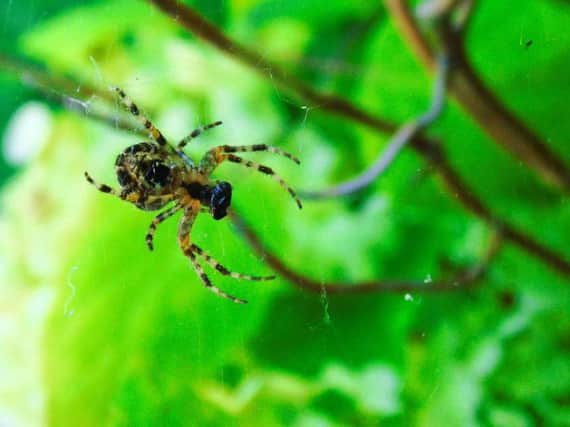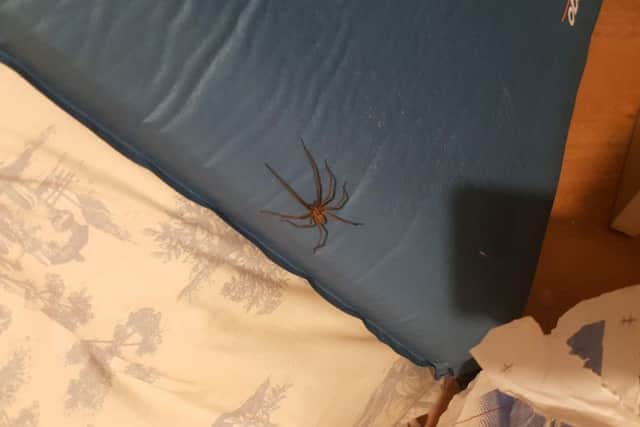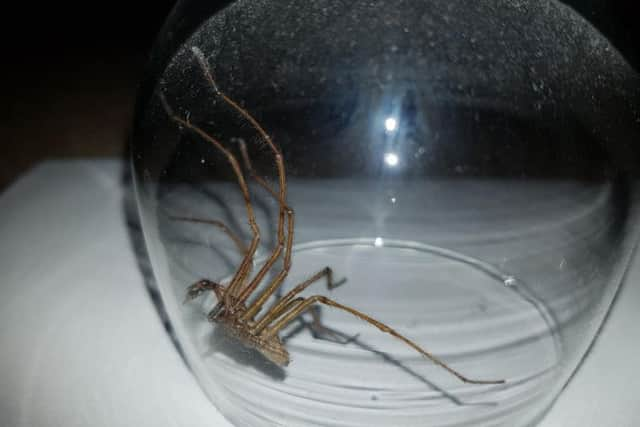Why massive horny spiders mating in your house is actually a good thing


Yet few appreciate the work these animals do in keeping our homes clean. Spiders are an essential part of global ecosystems. They serve to improve hygiene in and around our homes by controlling genuine pest species and vectors of disease, writes Richard Pearce.
Spider season begins as massive horny spiders search for sex in Leeds homesIndeed, spiders do not spread disease themselves and are extremely adept at controlling populations of insects that pose a genuine threat to human health.
Advertisement
Hide AdAdvertisement
Hide AdMoreover, spiders are key parts of the food chain for larger animals. Their existence significantly increases the quantity and diversity of prey available to birds and mammals, thus maintaining the wondrous diversity of life on Earth and enriching all our lives. Our planetary biodiversity and global ecology is, in significant part, dependant on these remarkable animals.


Alarmist newspaper stories are far from. To date, more than 45,000 species of spider have been described worldwide, with new species still being discovered every year.
Spider season: How to keep spiders out of your homeIn Britain alone, we have documented approximately 670 different species, including orb-weavers, jumping spiders, spiders that live under bark and some, even, that build homes under water.
For the purposes of this article I shall focus on just two groups; the humble house spider (Tegenaria spp.) and the garden orb-weaver (Araneus spp.), as these account for many sightings in the early autumn months. Every year at about this time, the newspapers abound with alarmist stories of spiders invading our homes. Such stories bear little relation to the truth and only serve to increase needless fear of spiders in many.
Advertisement
Hide AdAdvertisement
Hide AdWhilst it is true that spiders are more visible at this time, stories of home invasion are precisely that – just stories. There is simply no evidence to support the idea that house spiders live outside during the summer months and then ‘invade’ our homes in the autumn to breed and overwinter. Rather, these timid animals share our homes with us unnoticed throughout the year, quietly going about their business of keeping pests at bay without causing us any harm.


Why, then, the apparent influx at the beginning of autumn? The simple truth is that many species reach sexual maturity at this time of year. Males are more active as they roam in search of females (this makes them no more ‘sex-crazed’ than any other animal). Whilst it is the leggy male house spider that is often most noticeable in the home, you are more likely to notice female orb-weavers in your garden during the autumn months. Hanging upside down in their intricately constructed webs, their plump and frequently colourful bodies draw the eye, yet these animals offer no threat to us.
Only a tiny fraction of British spider species are capable of biting humans and, even then, only as a last resort when they feel their lives are threatened. Despite media scare stories, none of these species can do us any real harm. The horror stories perpetuated by the UK press are unwarranted. Many of the effects of alleged bites reported in the press bear no relation to genuine documented cases of spider bite.
Of course, as with any bites by spiders or insects, there is always a minor risk of secondary infection if the wound is not clean, but this has nothing to do with the spider per se and everything to do with puncture wounds and wound hygiene. Indeed, bites from spiders are cleaner and far less likely to transmit disease than those from many biting flies.
Advertisement
Hide AdAdvertisement
Hide AdIn short, the threat posed by spiders is negligible and the benefits they bring are many. Add to that the sad fact that many species of spider, both globally and in the UK, are struggling to cope with habitat loss and many other threats. Whilst some species thrive, many others are dwindling and may be lost altogether if preventative action is not taken in time.


Every spider matters. Learning to live alongside these marvellous creatures can only be good for us and our planet. We are better off, by far, with spiders in our lives.
Dr Pearce (Twitter@DrRichJP) is a member of the British Arachnological Society (BAS). The BAS is devoted exclusively to the study and understanding of arachnids. For more information about spiders, please visit the BAS website at http://britishspiders.org.uk (Twitter@BritishSpiders)